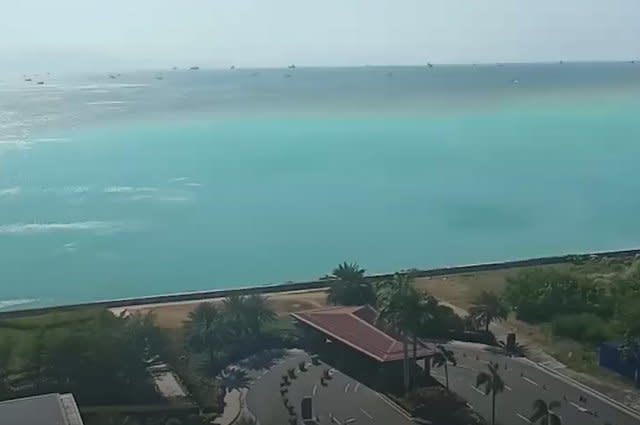People mistook Manila Bay’s newly blue waters for a sign of less pollution


By Emerald Pellot, In The Know
Once so polluted that its waters were deemed toxic, Manila Bay, located in the Philippines, has since reverted to what locals believe is its natural turquoise state. But officials say they're wrong - the cause is, in fact, pollution.
"Based on previous reports of Marine Environmental Protection Command, the water's discoloration occurs when there are pollutants," Philippine Coast Guard Commodore Armand Balilo said, according to Filipino outlet GMA News.
Despite the fact that the air quality in Manila Bay has greatly improved as a result of a government-imposed lockdown, the bay's waters remain dangerous. According to GMA, the waters may have turned turquoise due to a discharge of chlorine from a nearby pool.
Officials say the phenomenon now requires an immediate study, as the bay may pose a health risk to locals, especially the area's fishing community.
In an interview with Filipino publication Interaksyon, however, Gloria Estenzo Ramos, vice president of the environmental nonprofit group Oceana, said she remained hopeful that the lockdown itself would eventually have a positive effect on the bay's waters.
"Human activities are the sources of pollution and destruction of our environment," she explained. "When we stay away, due to [an enhanced community quarantine], from activities that cause pollution, destruction and degradation to the natural environment, whether on land, sea or air, nature heals."
【ギャラリー】Pictures of the week: April 5 - 1130
The evidence so far seems to support Ramos' claim. Across the globe, air pollution and carbon dioxide levels have decreased significantly due to mass lockdowns.
"Scientists say that by May, when [carbon dioxide] emissions are at their peak thanks to the decomposition of leaves, the levels recorded might be the lowest since the financial crisis over a decade ago," BBC News points out.

This article first appeared on In The Know.

 Yahoo News
Yahoo News 

